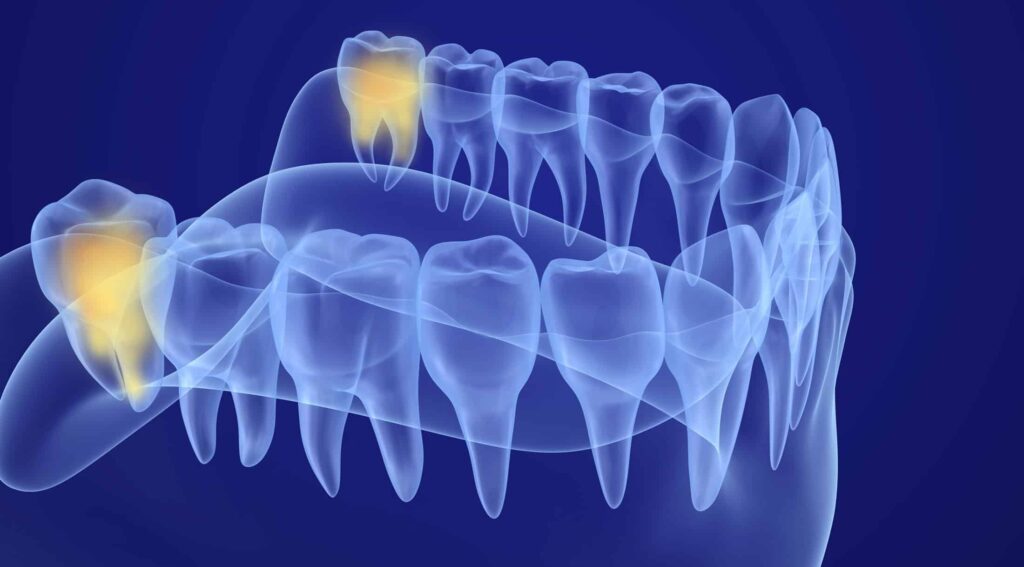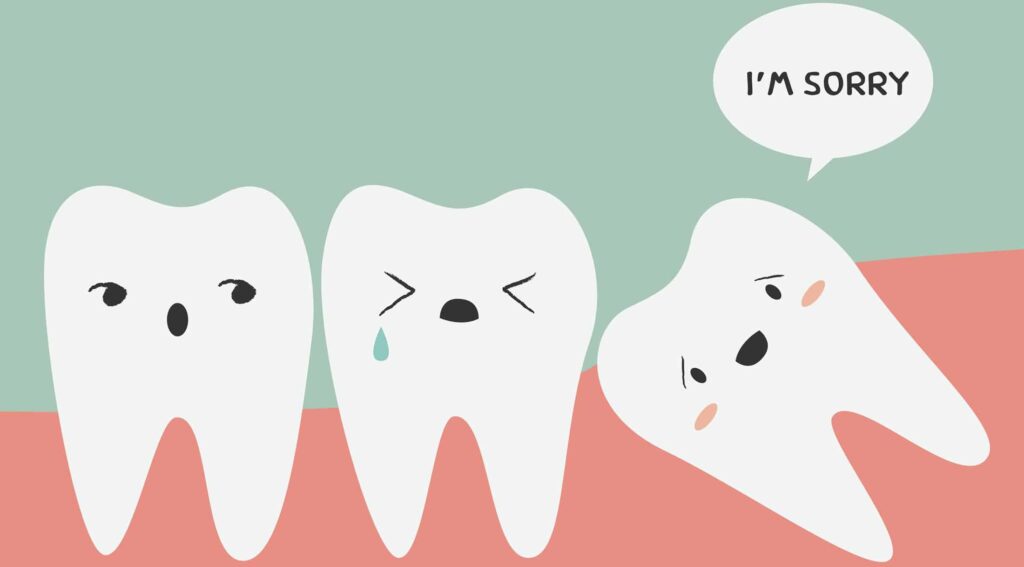What are wisdom teeth?
Wisdom teeth are the third molars (back teeth) that usually come out in pairs during your late teens or early 20s. They are called wisdom teeth because they erupt (come out through the gums) late in life, long after the other teeth have erupted.
It is believed that the jaws of earlier humans were more pronounced than modern humans and housed more teeth to help better grind cellulose heavy vegetation. Wisdom teeth are a vestigial trait leftover from our human ancestors.
Not everyone has wisdom teeth issues, but they can cause various dental problems including the overcrowding of existing teeth and impaction. Impaction is when a wisdom tooth comes through at an angle and pushes into the gum or the tooth beside it. If wisdom teeth are causing problems, it is recommended to have them removed.
Problems with Wisdom Teeth
Some wisdom teeth erupt without causing any problems, but sometimes, wisdom teeth come through at an angle and push into the gum or the tooth beside them which is called impaction.
When a wisdom tooth is impacted, it may completely erupt from the gum, partially erupt from the gum (partially impacted), or even remain trapped in the gum (fully impacted). Depending on the degree of impaction and the angle that the tooth has grown may lead to several problems and complications, including:
- Chewing Problems – Crowded wisdom teeth in the upper jaw often lean sideways and rub against the cheek. This may cause ulcers on the cheek and chewing problems
- Gum Disease and Tooth Decay – A wisdom tooth that has only partially erupted from the gum may lead to an inflammation or infection in the surrounding tissue which is called pericoronitis. Brushing such teeth can be difficult and as a result, food and bacteria can get stuck between the wisdom tooth and the tooth next to it, leading to tooth decay and gum infections
- Tooth Damage – Due to lack of space, a erupted wisdom tooth can push against the second molar causing damage to both teeth. A wisdom tooth that lying inside the gums because it has failed to erupt can also cause damage to the roots of nearby teeth
- Cysts and Bone Loss – Teeth develop in sacs in the jawbone. The sac containing a partially or fully impacted wisdom tooth may fill with fluid, forming a cyst. A cyst may damage surrounding tissue, bone and nerves, and may even develop into a benign tumour. Cysts and tumours may require the removal of bone and gum tissue to treat
Symptoms of Wisdom Teeth Infection
Depending on the degree of impaction and the amount of damage or infection, the symptoms of wisdom tooth problems vary, but may include:
- Difficulty in chewing or swallowing due to pain
- Fever or inflammation of the gums
- Bad breath
- Lymph node pain and inflammation (under the jaw)
- Pus coming from the gums around the infected tooth
- Cheek ulcers
Treatment for wisdom teeth infection
Depending on the degree of impaction, treatment for wisdom teeth issues may involve a range of procedures such as:
- By improving oral hygiene in the area
- By having the area cleaned by a dentist
- sometimes, by the prescription of antibiotics
A dentist will first evaluate the teeth and jaw to investigate the degree of impaction and any other issues that may have arisen, such as teeth decay, damage, or infection. The dentist might take an x-ray if the issue is not clear in a visual inspection. Based on the diagnosis, an appropriate treatment will be prescribed such as pain relievers or antibiotics. A common treatment involves the removal of wisdom teeth.
Removal of wisdom teeth
Dental x-rays will help to tell if wisdom teeth might cause problems. Some wisdom teeth do not cause problems and do not need to be taken out. However, if the wisdom tooth is damaging nearby teeth or causing several problems, the only alternative would be to remove it through surgery.
Wisdom teeth surgery is mostly performed with a local to numb the area around the tooth. In rare cases where the wisdom teeth are deeply impacted, a general anaesthetic may be given. After the wisdom tooth has been removed, the wound is typically packed with gauze and stitched. There will be some pain and bleeding after the surgery, but any remaining discomfort or bleeding will pass in a few days.
One possible complication of wisdom teeth removal is a dry socket which is called alveolar osteitis. This happens when the area where the tooth was extracted does not heal properly. However, a dry socket can be successfully treated by the dentist.
Care after surgery for removal of wisdom teeth
Your dentist will guide you on how to care for your mouth after your wisdom tooth surgery. Some general suggestions include:
- Take pain-relieving medication if needed on prescription
- Swish warm salty water in your mouth after meals and no earlier than 24 hours after surgery
- Eat soft, easy-to-chew foods for few days after surgery
- Do not smoke for 48 hours after the surgery
- Avoid alcohol
Having problems with wisdom teeth?
Book a consultation by calling our friendly team on 3390 6100 or by emailing us. Or click here to book your appointment online.









